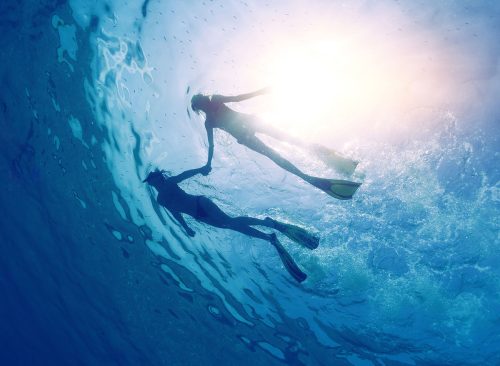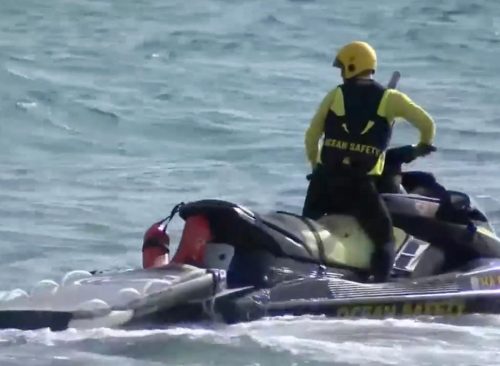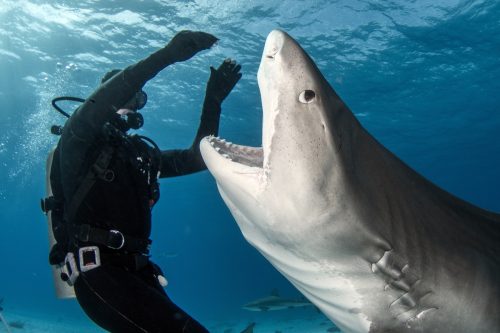60-Year Old Woman Who Went Missing While Snorkeling With Husband in Hawaii “Was Probably Attacked by Aggressive Shark”
The couple were snorkeling 50 yards offshore when the attack occured.

Shark attacks might not be very common, but they do happen. According to the Florida Museum of Natural History’s International Shark Attack File, in 2021, there were 73 unprovoked shark attacks and nine unprovoked shark bite fatalities. Most shark bites occur in warm waters, such as the South Pacific, Australia, and Brazil. In the United States, the greatest concentration occurs in Hawaii and Florida. This week, a Washington woman vacationing in Hawaii became an unfortunate part of that statistic after disappearing from the ocean while snorkeling. Investigators believe she was likely eaten by an aggressive shark. Read more to learn what happened to her and what to do when a shark approaches you.

The 60-year-old woman, whose name has not been released, was snorkeling last week at Keawakapu Beach in Maui County with her husband, according to the Hawaii Department of Land and Natural Resources. The two were about 50 yards offshore when he noticed an “aggressive” shark approaching.

“He said he and his wife were not snorkeling right next to one another and he could only see her from time to time,” the department explained in a statement. “As the shark continued to circle him he continued looking for his wife and thought that she might have been diving toward the ocean floor.”

According to the husband, the shark swam away as he got out of the water, searching for his wife. “He did spot something in the distance and then the shark came back, and he could see something red around the shark’s gills,” the report says.

“At that time, he said people on the beach began yelling at him to get out of the water because a shark was feeding in the area,” it continues. According to a witness, the big shark was indeed feeding on something. He tried to locate the couple who was snorkeling to warn them but saw the shark continuing to feed on something “in the middle of the red cloud in the water.” He yelled at the man to get out but didn’t see the woman. He then called 911.

A body was never located. However, a swimsuit and snorkel gear were later found. DOCARE declared the death “a tragic accident.” adding. “It’s unfortunate that this family’s grief is exacerbated not only by not having their loved one’s body recovered. But by misinformation which spread quickly on social media platforms, suggesting that this was something other than what it was.”

Sharks are often depicted as dangerous and aggressive predators. While this reputation is not entirely deserved, it is important to recognize that sharks can be dangerous to humans under certain circumstances. Some species of sharks, such as great whites and tigers, can grow to be over 20 feet in length and weigh over two tons. These sharks are capable of causing severe injuries or even death to humans if they attack.
Sharks are apex predators and are often found in areas where humans swim or surf. While attacks on humans are rare, they do occur, especially in areas where there is a high concentration of sharks or where humans are engaging in activities that may attract sharks, such as spearfishing or feeding dolphins.

Some species of sharks are more prone to attacking humans than others. For example, great whites, tigers, and bull sharks are known to be responsible for a higher number of attacks on humans than other species.
Overall, while the risk of being attacked by a shark is low, it is essential to be aware of the potential dangers and to take precautions when swimming or surfing in areas where sharks are known to be present. This includes following local beach safety guidelines and avoiding activities that may attract sharks.

If you find yourself being attacked by a shark, it is vital to take immediate action to protect yourself and minimize the risk of injury. Here are some steps you can take:
Try to get out of the water: If you are able to, try to swim or wade to safety as quickly as possible. If you are on a surfboard or other flotation device, use it to get to shore. If you are unable to get out of the water, try to stay as calm as possible and look for any nearby objects you can use to defend yourself.
Use any available weapons: If you have any objects that you can use as a weapon, such as a spear, a camera, or a rock, try to use them to defend yourself. Aim for the shark’s eyes, gills, or nose, as these are the most sensitive areas.
Protect yourself: If you are unable to get out of the water or use a weapon, try to protect yourself by covering your neck and head with your arms and hands. If possible, try to stay as still as possible and avoid splashing or thrashing around, as this may attract the shark.
Seek help: If you are able to get out of the water, try to find someone to help you as soon as possible. Dial 911 or contact the local authorities for assistance.














